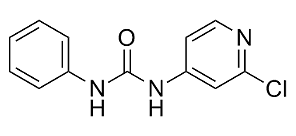All AbMole products are for research use only, cannot be used for human consumption.

Forchlorfenuron is a plant growth regulator and cytokinin, it can be used to increase fruit size of fruits. Forchlorfenuron inhibits septins and exhibits anti-parasitic, anticancer, and anti-angiogenic activities. Cytotoxicity of forchlorfenuron and its metabolites are tested through Sulforhodamine B assays against CHO cells. Forchlorfenuron exhibits significant cytotoxicity against CHO cells with an IC50 of 12.12±2.14 μM.
In live mammalian cells, FCF dampens septin dynamics and induces the assembly of abnormally large septin structures. FCF has a low level of cytotoxicity, and these effects are reversed upon FCF washout. Significantly, FCF treatment induces mitotic and cell migration defects that phenocopy the effects of septin depletion by small interfering RNA. FCF targets the filamentous assembly of divergent septin isoforms (e.g. Cdc3/10/11/12 (42), SEPT2, SEPT7) reversibly and across species.
Forchlorfenuron (FCF) has low oral toxicity in rats with an LD50 of 4940 mg/kg bw in male rats and 4899 mg/kg bw in females.
| Cell Experiment | |
|---|---|
| Cell lines | HeLa or MDCK cells |
| Preparation method | HeLa or MDCK cells are plated overnight on collagen-coated 35-mm tissue culture dishes and then treated with DMSO or FCF for 4 h. Cells are trypsinized, resuspended in DMEM supplemented with 10% FBS, and mixed in a 1:1 ratio with trypan blue at room temperature for 1 min. Blue and non-blue cells are counted using a hemocytometer. |
| Concentrations | 6.25-500 μM |
| Incubation time | 4 h |
| Animal Experiment | |
|---|---|
| Animal models | toxicity test of forchlorfenuron in rats |
| Formulation | - |
| Dosages | 4940 mg/kg bw in male rats and 4899 mg/kg bw in females |
| Administration | oral |
| Molecular Weight | 247.68 |
| Formula | C12H10ClN3O |
| CAS Number | 68157-60-8 |
| Form | Solid |
| Solubility (25°C) | DMSO ≥ 60 mg/mL |
| Storage |
Powder -20°C 3 years ; 4°C 2 years In solvent -80°C 6 months ; -20°C 1 month |
| Related Plant growth regulators Products |
|---|
| Traumatic Acid
Traumatic acid (Trans-2-dodecenedioic acid) is the product of a biosynthetic pathway from a physiological role of alpha-ketol fatty acids in plant lipid hydroperoxide lyase metabolism. Traumatic acid (Trans-2-dodecenedioic acid) is also used in would healing as it stimulates cell division to form a protective callus around the wound site. |
| Paclobutrazol (97%)
Paclobutrazol is a triazole-containing plant growth retardant that is known to inhibit the biosynthesis of gibberellins. Paclobutrazol, transported acropetally in plants, can also suppress the synthesis of abscisic acid and induce chilling tolerance in plants. Paclobutrazol also has antifungal activities. |
| 24-epi-Castasterone
24-epi-Castasterone, a brassinosteroid, is a nature product that could be isolated from Hydrodictyon reticulatwn. |
| 2,4-D sodium salt
2,4-D sodium salt is a selective herbicide for the control of broad-leaved weeds. 2,4-D sodium salt inhibits DNA and protein synthesis, thereby preventing normal plant growth and development. 2,4-D sodium salt can induce apoptosis. |
| 3-Chloro-4-hydroxyphenylacetic acid
3-Chloro-4-hydroxyphenylacetic acid is an auxin influx inhibitor. 3-Chloro-4-hydroxyphenylacetic acid is one of the major chlorinated metabolite of chlorotyrosine. |
All AbMole products are for research use only, cannot be used for human consumption or veterinary use. We do not provide products or services to individuals. Please comply with the intended use and do not use AbMole products for any other purpose.


Products are for research use only. Not for human use. We do not sell to patients.
© Copyright 2010-2024 AbMole BioScience. All Rights Reserved.
